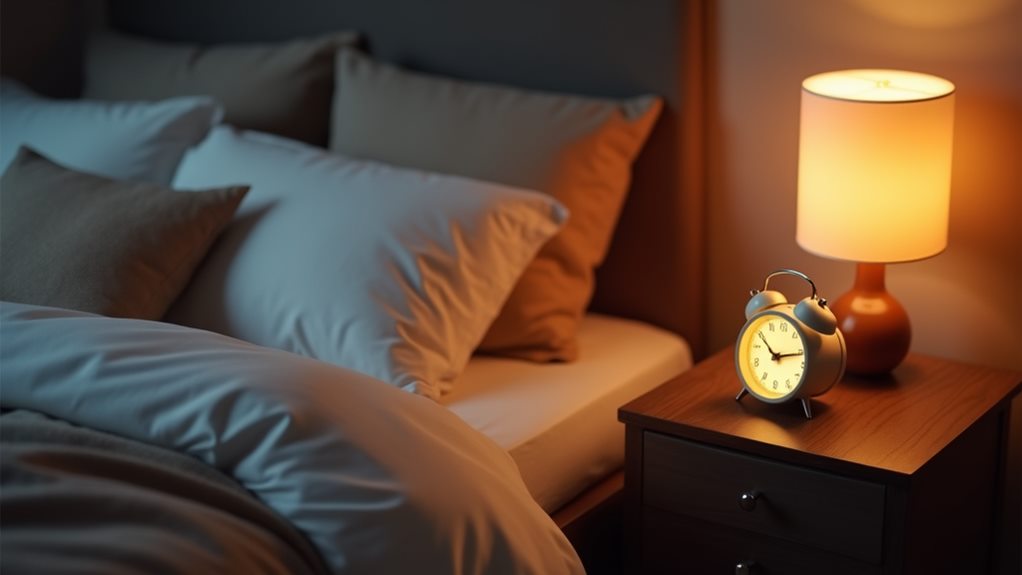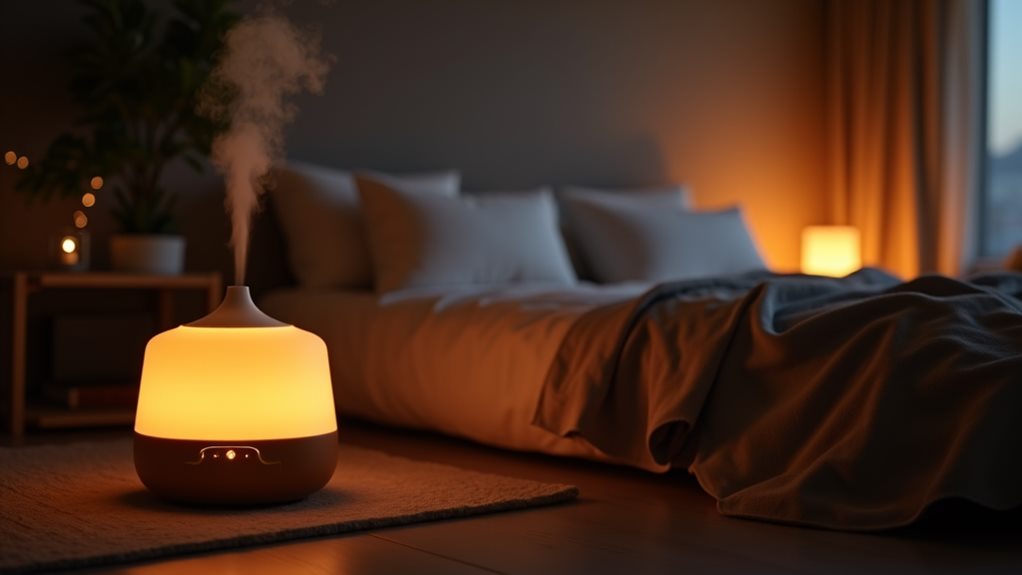
You might not realize how much your emotional balance depends on the quality of your sleep. While many people focus on diet and exercise for mental well-being, sleep often gets overlooked as an essential factor. A consistent sleep routine, a calming sleep environment, and relaxation techniques can work wonders. Each of these strategies reinforces your natural circadian rhythm, reduces stress, and sets the stage for a more balanced mood. If you’re aiming for emotional stability, it’s time to reflect on how you can optimize your sleep to support both your mind and body.
Consistent Sleep Routine

Establishing a consistent sleep routine is essential for reinforcing your body’s circadian rhythm, which helps you fall asleep faster and improve sleep quality. By sticking to a regular sleep schedule, you set the stage for adequate sleep that supports both emotional balance and overall well-being.
Implementing practices like mindfulness exercises before bedtime can further enhance relaxation, making it easier to shift into sleep. Aim to go to bed and wake up at the same time every day, even on weekends, to prevent disruptions to your body’s natural cycle. This consistency helps in predicting your sleep cycles, ensuring you’re primed for rest and rejuvenation.
To optimize your sleep quality, craft a bedtime routine aligned with your desired wake-up time. This routine trains your brain to recognize bedtime as a preparation period for sleep onset.
If you find yourself tossing and turning, unable to drift into slumber within 20 minutes, engage in a calming activity outside your bedroom to avoid associating your bed with restlessness. When tiredness eventually returns, you’ll find sleep comes more naturally.
Implementing a consistent sleep routine not only nurtures your body’s circadian rhythm but also greatly contributes to emotional stability and mental clarity, enabling you to face daily challenges with a refreshed mind and body.
Create a Calming Environment
Crafting a sleep-friendly environment is pivotal for enhancing sleep quality and fostering emotional balance. Start by ensuring your sleep environment is cool, dark, and quiet. A cooler room can help your body temperature drop, which signals it’s time to sleep. Block out unwanted light with blackout curtains, as light exposure can delay sleep onset. Incorporating elements like comfortable bedding and regular cleaning can improve sleep hygiene and comfort.
Additionally, using earplugs or a white noise machine keeps disruptive sounds at bay, maintaining a restful atmosphere. A tidy, pleasant sleep space contributes to relaxation. Comfortable bedding can play a huge role in how quickly you fall asleep and remain so throughout the night. It signals to your body that it’s time to rest. Opt for linens that feel good to the touch, enhancing your overall sleep quality immediately upon lying down.
Incorporate calming pre-sleep activities to further solidify this tranquil setting. Consider reading a soothing book or indulging in a warm bath. These actions naturally prepare your body and mind for sleep, gently nudging you toward a state ready for rest.
Incorporate Relaxation Techniques

While creating a calming environment sets the stage for better sleep, incorporating relaxation techniques enhances your ability to drift into a restful slumber. Engaging in mindfulness practices, such as meditation, can additionally support your mental health by promoting relaxation and reducing stress levels.
To improve sleep quality and find emotional balance, consider adding gentle yoga or meditation to your evening routine. These relaxation techniques reduce stress by calming your mind and preparing it for a peaceful night. Mindfulness techniques, such as deep breathing exercises, can be part of your calming pre-sleep routine, helping you wind down gradually.
Engaging in activities like reading a book or taking a warm bath an hour or so before bed also signals your body it’s time to relax. These practices ease tension and improve sleep onset, contributing to a higher quality of sleep and overall emotional health.
Guided sleep meditations, in particular, can work wonders in alleviating anxiety. By focusing on soothing stories or calming visualizations, you can foster relaxation and enhance your emotional resilience.
Incorporating these relaxation techniques regularly not only leads to better sleep but also helps you cope more effectively with daily stressors. By integrating these practices, you’ll experience enhanced overall sleep quality, setting you on a path toward greater emotional balance.














